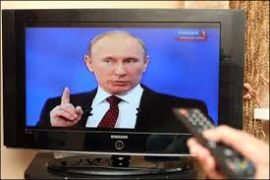Analytics, Baltic States – CIS, Education and Science, EU – Baltic States, Legislation, Markets and Companies
International Internet Magazine. Baltic States news & analytics
Wednesday, 11.02.2026, 07:08
Baltic think tank: Kremlin uses lies, intimidation to maintain dominance
 Print version
Print version |
|---|
As a consequence, Russia would develop as a virtually ideological multi-dimensional fortress with its walls built in people's minds and hearts, authors of the book conclude.
Leading Lithuanian expert in information warfare, researcher at the Institute of International Relations and Political Science (Vilnius University) Nerijus Maliukevicius and Lithuanian expert on political and international relations Simonas Algirdas Spurga point in the study to the essential role of the media in building Russia's virtual fortress. Since there was no real enemy menacing Russia from the West, the Kremlin invented one.
The cynicism with which the Russian media are spreading their propaganda and disinformation is unparalleled, the researchers say, adding that cultivating fear and lies is the daily routing of the Russian media. They "have to lie that Russia is a besieged fortress because this will make the people rally around the nation's leader".
The propagation of the notion of besieged fortress in the Russian media results in the so called self-fulfilling prophecies - fearing the seemingly ominous external world, the Russians support President Vladimir Putin's aggressive foreign policy, which eventually indeed sets the free world against the revanchist Putin regime and sometimes even against whole Russia.
Putins' possibilities of making Russia an attractive regional power are quite limited, so the Russian president has to resort to propaganda to attain his goals. This propaganda, however, works like narcotics, providing a temporary relief but exacerbating problems in the long run.
"Unfortunately, this regional dominance, which is real only occasionally, is paid with real Russian budget money and neighbors' lives," says Russian publicist and expert on the regional policy issues Dmitry Oreshkin. He also warns that Putin's ideology is leading Russia towards cataclysms which may prove dangerous to its neighbor countries as well.
Andris Kudors, executive director of the Center for East European Policy Studies and editor of the collection of articles said at the book's presentation that the Baltic states have tried to follow pragmatic policies in relations with Russia but that the Kremlin's compatriot and media policy is aimed at causing divisions in the Baltic states' society. The Baltic states should respond to this by uniting their nations around their national symbols and democratic values and taking an active part in building the EU's foreign policy that would offset Russia's destructive impact.
Also, the West should realize that the Baltic nations' attempts to strengthen their national identity is a strong protective instrument against the authoritarian and revanchist Russia, which does not aim to promote democracy in its neighborhood, but uses the Baltic states' openness to gain regional dominance.
A united position of the U.S., NATO and the EU is essential in deterring Russia. "Moscow knows how to scare others, but when it is faced with real force, it withdraws," Kudors said.
The collection of articles “Fortress Russia: Political, Economic, and Security Development in Russia Following the Annexation of Crimea and its Consequences for the Baltic States” deals with political and economic processes in Russia from the annexation of Crimea until late 2015. The book is subdivided into four parts: Ideology, Politics, Economy and Security.








 «The Baltic Course» Is Sold and Stays in Business!
«The Baltic Course» Is Sold and Stays in Business!

